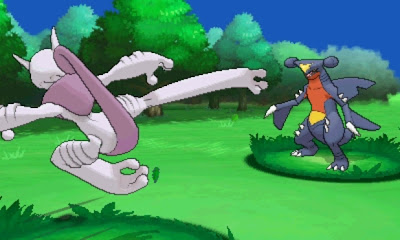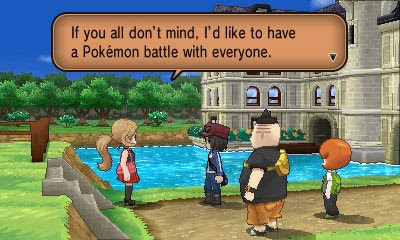When the cashier asked how he could help me, I had a choice. I could quietly ask for my E-rated interactive cartoon, hope nobody heard me, and leave the store in shame, or I could take charge of the situation like the grown-ass man that I am. "I'm picking up my Pokémon Y preorder," I said, perhaps a bit too loudly. The pre-teen browsing at the other end of the store looked over his shoulder to lock eyes with me and give a deferential nod. Nailed it.
Just over fifteen years ago, my mom bought me Pokémon Blue for my Game Boy and I haven't missed a generation yet. Sure, the games are great, but there are more powerful forces at work here. The Pokémon series makes repeated use of a few key elements to make them very easy to pick up but exceedingly difficult to put down. Without further ado, here are five reasons that Pokémon is the perfect storm of addictiveness.
 |
My girlfriend Ani, though a gamer in her own right, has no experience with the Pokémon franchise. She prefers games of a more shoot-you-in-the-face variety. I was curious how it would look through the eyes of the uninitiated, so the two of us sat down together so I could explain the gameplay basics. The conversation lasted all of five minutes before she was off on her own adventure.
Unless we're talking about competitive play, there isn't a whole lot to explain. The new games, X and Y, are far friendlier than previous versions. This time around, picking your team based on which Pokémon you like best is a completely valid strategy. The inclusion of the new XP Share item works wonders to cut out much of the grinding that we all dreaded so much whenever we caught a low-level new hotness. Very seldom did I stop to train in tall grass; I simply challenged every trainer and gym in sequence, and my entire team was consistently about ten levels higher than the opposition. While I do enjoy a challenge—for reference, Dark Souls is my favorite game ever—I believe that this was the right design choice. An easier game overall allows the player to focus on building a team of Pokémon that they really like rather than stressing over what is viable.
 |
| This doesn't even include Generation VI. |
COLLECTING
If you grew up in the '90s like I did, chances are you had a collection of something. Sports cards. Magic: the Gathering. Beanie Babies. Pogs. In my case, I had a collection of all of them. To this day, I still don't understand the appeal of gathering a hoard of items with similar characteristics as part of a set. I just know that it feels good.
Game Freak knows this too, and has made amassing a respectable collection of Pokémon easier and more fun than ever. For starters, capturing wild 'mon grants experience now. Gone are the days where you had to choose between precious XP for your team and locking a seventh Pidgey in the PC Box for eternity. There is also a great deal of diversity in which Pokémon are available in the wild early on. By the time I reached the second gym, I had already filled my roster with six Pokémon—each one a different type.
The Kalos Pokédex is separated into three regions: Central, Coastal, and Mountain. As you progress through each area, you will continue to encounter different Pokémon from all six generations. At no point did I feel like I was treading on familiar territory, as each area held new 'mon for me to battle and capture. As of this generation, there are 718 Pokémon total, although not all of them are available in game—the completionists among us have their work cut out for them.
 |
| It only took fifteen years to update the graphics! |
LEVELING UP
Ten years ago, the only games that had RPG elements were RPGs. Since then, phrases like leveling up, skill points, and spec or load-out have popped up in every corner of the gaming industry. Shooter fan? Borderlands 2 has skill trees and loot, and Call of Duty features a level up system which unlocks persistent upgrades for your account. Grow up with platformers? Dust: An Elysian Tale offers skills and magic that become accessible as the character levels up, as well as more powerful equipment as you progress. Even the puzzle genre has adopted RPG elements in such titles as Puzzle Quest and Puzzle & Dragons.
So why have RPG elements become so pervasive? Well, simply put, they feel fantastic. Watching a progress bar fill up then 'ding' and knowing that you just became stronger is immensely satisfying. In Pokémon it happens all the time. Even at high levels, with a full party of six, you need only battle a trainer or two before the inevitable 'ding' moment, complete with a catchy jingle.
Which brings me to my next point…
 |
| Try to think of the last time you saw *anything* in the distance in a Pokémon game. |
FREQUENT PAYOUT
If you like video games and you live on planet Earth, there is a pretty good chance you recognize this music:
This short track is from The Legend of Zelda: Ocarina of Time, and it would play whenever you opened a large chest in a dungeon. The Zelda series is somewhat famous for using short ditties to signify progress. Here's the "solved puzzle" sound:
The Zelda series conditions the player to associate these sounds with progress. Pokémon is no different. For every 'correct' action you take—whether it is leveling up, finding an item, or healing your Pokémon—there is a corresponding 'jingle' as if to say, "Top-notch Pokémon-ing. Keep up the good work."
This technique is also used outside of the video game industry to great effect. In an interesting study on the science of slot machines, a team observed the effect of 'celebratory sounds' on a gambler's thoughts regarding their play session. The most compelling point is regarding "disguised losses." Imagine you put a quarter into a slot machine, and you win five cents. The machine lights up and plays a bunch of fun sounds, then spits out your nickel. The truth is that you just lost twenty cents, even though the machine acted as if you had won. Gamblers will sit for hours at slot machines chasing this feeling.
Silly as it may sound, this practice is present in the Pokémon games. As I mentioned above, Pokémon uses audio cues and catchy jingles to reward 'correct' behavior. After thirty hours of playtime, I could not care less about the potion hidden around the corner on Victory Road, but I pick it up anyway because that's what the game trained me to do. Pokémon is a slot machine that pays out every ten seconds—and it feels wonderful.
 |
| These guys will always hold a special place in my heart. |
NOSTALGIA
If reading this article has not made it readily apparent, I did most of my growing up in the '90s. (All I remember from the '80s are birthday parties and excellent music.) I have revisited many of my favorite games from my childhood, and each time it feels as if I'm greeting an old friend.
Nostalgia is a powerful phenomenon—one that causes us to see the past through tinted glasses and sometimes remember titles with more fondness than they deserve.
Game Freak is fully aware of the power of nostalgia, and practically weaponizes it in Pokémon X and Y. Early on you are given your choice among the original three starters. (Bulbasaur, how I've missed you.) You need only walk into some tall grass to see Pokémon from the previous five generations, ready to be captured. Even the legendary bird trio from Pokémon Red and Blue make an appearance.
Pokémon remembers its roots, and Game Freak knows that their fans do too. This generation of Pokémon games has embraced both old and new. It's still the Pokémon you know and love, complete with familiar faces and tried-and-true gameplay, but there's enough new to keep it fresh and exciting (and you can move DIAGONALLY).
 |
Clearly I'm a fan of the Pokémon games, but if you think that I've missed anything or spend way too much time thinking about handheld games, feel free to shout out in the comments below!






0 comments: